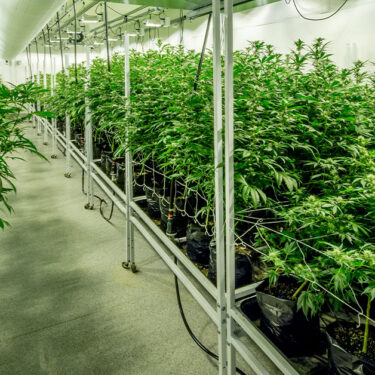The U.S. cannabis industry could exceed $45 billion in annual sales by 2025, according to a recent projection published in the 2021 Marijuana Business Factbook. That could mean double the sales of $22 to $26.4 billion projected for recreational and medical cannabis this year.
Marijuana markets are growing rapidly in the U.S. and Canada, with the Factbook reporting 100 percent of investors anticipate 2021 sales to top those in 2020. American cannabis companies are also expected to employ more than 400,000 individuals in full-time positions this year, up from the 321,000 jobs estimated in January.
Since the beginning of the pandemic, 42 percent of cannabis users in the U.S.1 and over one-third of those in Canada2 have increased their use.
“We are definitely seeing a significant number of cannabis companies opening up in Canada,” said Allison Sinha, Product Manager, Commercial Insurance, Burns & Wilcox, Toronto, Ontario. Marijuana retail licenses were recently expanded in Ontario3 and the country’s new “micro” licenses have also spurred activity.4 “There are many new opportunities to expand and grow their businesses.”
Nevertheless, with greater success and expansion cannabis companies can also face greater risks for losses. From accidents at marijuana facilities to the liability associated with contaminated products, cannabis-related perils call for careful risk management protocols and insurance solutions, including Premise Liability Insurance, Product Liability Insurance, Product Recall Insurance, Commercial General Liability (CGL) Insurance, Employment Practices Liability Insurance (EPLI), and Crop Loss Insurance.
“With more states legalizing recreational and medicinal use and maturing businesses experiencing higher than expected sales, I am seeing a large influx of new insurance submissions,” said Emily McDaniel, Broker, Commercial Insurance, Burns & Wilcox, Denver, Colorado.
There remains significant room for more growth, added Jody Oster, Senior Broker, Property, Burns & Wilcox Brokerage, Chicago, Illinois. “Not all states have legalized recreational use, so market share is poised to increase in the future,” he said. “Given the demand for cannabis-infused edibles, topicals, medicines, oils and other products, the market is bound to grow.”
Higher volume can drive up risks
When demand and sales are up, dispensaries may need to source product from additional manufacturers, McDaniel said. Those manufacturers should have their own Product Liability Insurance in place to potentially assist with expenses related to lawsuits alleging bodily injury or other harm to a consumer caused by a product. “Without adequate insurance in place, these businesses could be on the hook for the entire cost of legal defense, medical expenses and more,” she said. “Dispensaries need to make sure their partner growers and distributors have the appropriate insurance in place.”
Product liability lawsuits are an ongoing concern for cannabis businesses in the U.S. and Canada. 5 As of last June, marijuana class-action lawsuits were on the rise in the U.S.; in Canada, a number of cannabis industry businesses faced large lawsuits alleging inaccurate listing of products’ potency last year.7

When companies expand, it often happens so rapidly that they find themselves falling behind when it comes to shoring up their risk management and insurance coverage; however, it is vital to stay ahead of these matters.
“The heightened risk of a lawsuit as a business grows also stems from the ‘law of large numbers,’” Sinha said. If more customers are entering a cannabis retail outlet, for example, the chance of someone being injured on the business premises naturally goes up. If an accident such as a slip and fall does occur, Premise Liability Insurance could help pay for related legal expenses and settlement costs.
“The more exposure you have in general, the more likely you are to have a lawsuit,” Sinha explained. “When companies expand, it often happens so rapidly that they find themselves falling behind when it comes to shoring up their risk management and insurance coverage; however, it is vital to stay ahead of these matters.”
The greatest risk to cannabis businesses may be the legal and regulatory uncertainty they face, Oster said. Because cannabis use is not legalized federally in the U.S., many marijuana business owners may face difficulty securing loans, obtaining insurance, finding contractors and determining their likely liability due to a lack of legal precendents.8 “Cannabis has been legal at the state level for a relatively short time,” he said. ”In some states there may be no court precedents whatsoever.”
Fires, theft pose significant risks to cannabis facilities
On April 3 a fire decimated a Los Angeles commercial building that housed a marijuana grow operation.9 The blaze, which required 170 firefighters and took four hours to put out, is still under investigation. This type of risk is not entirely uncommon; in fact, cannabis industry growth has reportedly prompted the National Fire Protection Association to consider creating specific guidance on fire safety considerations for cannabis growing and processing facilities.10
“Some lighting and grow equipment can be prone to fires,” McDaniel said. “Equipment safety has improved and some insurance carriers exclude certain equipment from their policies.”
In addition, Sinha explained, cannabis operations are at risk for vandalism and arson. Growing facilities are often heavily guarded but still face increased fire risks. During last May’s civil unrest, many American cannabis dispensaries were ransacked and robbed, including a Boston dispensary that lost $100,000 due to looting.11
Consequently, growing facilities in particular are often “built like Fort Knox,” Oster observed. “Growing facilities are commonly newly constructed or renovated for this specific purpose,” he said.
Other cannabis business property risks include physical damage to buildings or stock from severe weather, sewer backups or other events. Commercial Property Insurance, Flood Insurance and Stock Loss Insurance can help companies recoup losses related to these perils. If a cannabis retailer carries a product that requires refrigeration and it spoils because of a power loss, for example, this loss could be covered by Stock Loss Insurance. A separate type of policy, Crop Loss Insurance, addresses the risk of a fire, flood or other incident damaging cannabis crops.
“We have seen instances in which light bulbs have shattered and crops had to be disposed of due to glass contamination,” Sinha said. “Anything can happen.”
Wind, hail or water intrusion may also lead to equipment problems and Equipment Breakdown Insurance can help with related expenses. Cannabis grow facilities are essentially their own ecosystem, Oster said. “A grow facility is like a terrarium. If one piece of that terrarium goes offline, it is going to affect the product — and that product is expensive,” he said. “Growers make substantial investments in their facilities and they need to protect them.”
One lawsuit could bankrupt a cannabis business
New employment opportunities created by the cannabis industry are another avenue for potential risk and highlight the need for EPLI, which could help with costs of legal defense and other expenses related to lawsuits that allege discrimination, wrongful termination or other violations of workers’ rights. Cannabis companies should also be aware of regulations affecting employment, Sinha said.
“Like any business, cannabis retailers and other companies should exercise due diligence in hiring,” she said. “Companies must abide by all relevant laws, like Health Canada’s strict hiring guidelines, and ensure those who are working with cannabis are not also supporting the black market.”
Even as rapid business growth may put pressure on company leaders, the focus should remain on following best practices, particularly when it comes to Cannabis Insurance policies, Sinha emphasized.
“Business owners can get overwhelmed—especially when they are starting up,” she said. “Some skimp on their insurance policies without recognizing the potential consequences of facing a lawsuit without robust coverage,” Sinha said. “If they do not invest in adequate insurance at the outset, they may run into roadblocks later when they attempt to upgrade their coverage.”
Lawsuits represent a significant threat to any cannabis company, McDaniel added. “The outcome of a lawsuit for a company that lacks the appropriate insurance could very well be bankruptcy,” she said.
Since cannabis businesses may need a wide range of insurance coverages, they should work closely with insurance brokers with expertise in this area to ensure they are suitably protected. “Business leaders should have a full understanding of what their insurance policies cover and do not cover,” McDaniel said. “If they expand their operations, they are best served by being proactive and honest in disclosing any new operations to their broker: failing to do so could leave them without coverage for certain losses.”
Business owners may also want to consult their broker about insurance enhancements available for business interruption coverage, inquire whether their policy’s definition of “crop” includes seeds, and learn what is defined as inventory in their policies, Oster pointed out. “Brokers should be a risk advisor and walk company leaders through all of the definitions and help them understand both the coverage they have and what coverage can help them meet their particular needs.”
Sources
1 Kingston, Dan. “42% of Adults Increased Marijuana Use During COVID-19 Pandemic.” AZ Marijuana, December 17, 2020. 2 Marijuana Business Daily. “One-third of Canadian cannabis users consumed more during pandemic.” March 5, 2021. 3 “Cannabis Canada: Ontario doubles weekly pot shop licence issuances.” BNN Bloomberg, September 29, 2020. 4 Brown, David. “Micro cannabis licences continue to increase across Canada.” StratCann, October 31, 2020. 5 Ryskamp, Dani Alexis, J.D. “Legal Cannabis Gives Rise to Product Liability Class Actions in the US and Canada.” Expert Institute, June 25, 2020. 6 Smith, Jeff. “As marijuana class action lawsuits surge, experts stress accurate, forthright disclosures.” Marijuana Business Daily, June 10, 2020. 7 Breen, Kerri. “Cannabis companies facing proposed class-action lawsuit over alleged mislabelling.” Global News, June 18, 2020. 8 Werner-Simon, Julie A. “Where in America is marijuana still entirely illegal?” Marijuana Business Daily, March 24, 2021. 9 KTLA Digital Staff. “Firefighters take 4 hours to extinguish fire at commercial structure housing marijuana grow operation in South L.A.: LAFD.” KTLA, April 3, 2021. 10National Fire Protection Association. “Fire Protection of Cannabis Growing and Processing Facilities.” March 31, 2021. 11Gibson, Mary Jane. “Weed Dispensaries, Destroyed and Looted in Late-Night Unrest, Face Uncertain Future.” Rolling Stone, June 10, 2020.




